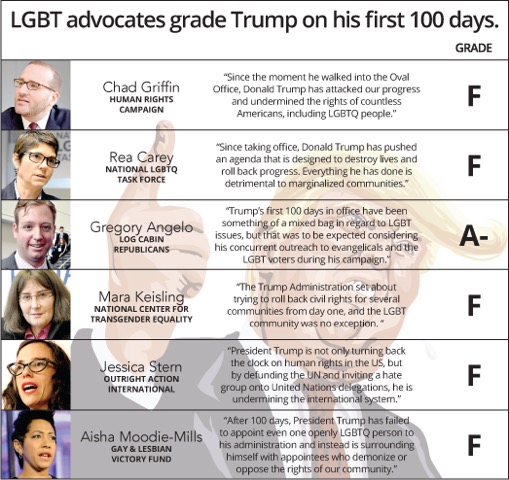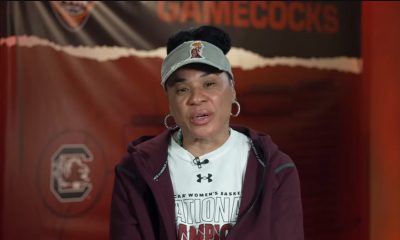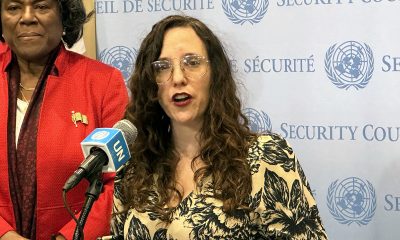homepage news
LGBT rights leaders flunk Trump on first 100 days
President lambasted over reversing trans guidance, anti-LGBT appointments
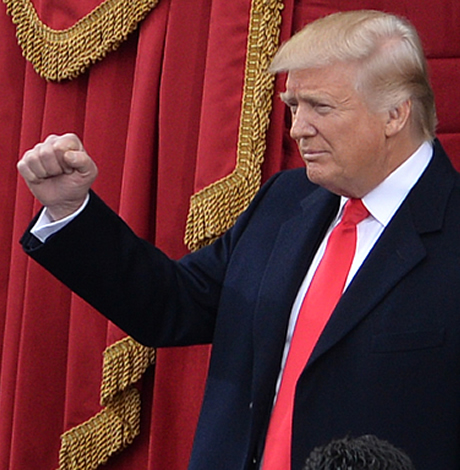
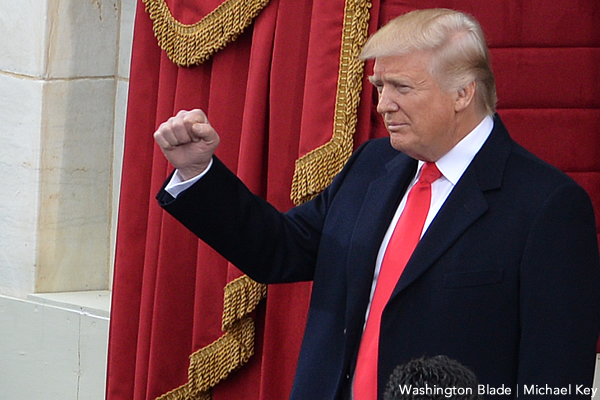
Donald Trump received failing grades from LGBT advocates after his first 100 days. (Washington Blade photo by Michael Key)
With the 100-day mark of President Trump’s time in the White House fast approaching, LGBT rights supporters are giving him failing grades as the nation evaluates him at the benchmark.
Since he took the oath of office on Jan. 20, the White House has asserted Trump is “respectful and supportive of LGBTQ rights,” but at the same time he has taken anti-LGBT actions — such as undoing guidance protecting transgender students — and filled his administration with opponents of LGBT rights.
The Washington Blade solicited evaluations and grade assessments from six LGBT advocacy organizations on Trump’s performance in anticipation of his 100th day in office on April 29. Each of the organizations gave the president a failing grade with the exception of Log Cabin Republicans, which gave him an “A-” grade.
Rea Carey, executive director of the National LGBTQ Task Force, said she gave Trump a failing grade for missteps ranging from anti-LGBT appointments, immigration enforcement that has “targeted undocumented immigrants with a vengeance” and a budget proposal that increases defense funding at the expense of programs for the middle class.
“Since taking office, Donald Trump has pushed an agenda that is designed to destroy lives and roll back progress,” Carey said. “Everything he has done is detrimental to marginalized communities. His executive orders and actions dehumanize and devalue entire communities of people — including trans children, people of color and women.”
To the surprise of many, the start of the administration saw limited support for LGBT rights. The White House within days of the new administration issued a statement declaring Trump is “respectful and supportive of LGBTQ rights” and would keep in place an executive order signed by President Obama in 2014 that barred federal contractors from engaging in anti-LGBT workplace discrimination.
The Trump administration also defied the wishes of anti-LGBT advocates seeking to purge the State Department of LGBT rights supporters by keeping in place Randy Berry in his role as special envoy for global international LGBT rights.
Gregory Angelo, president of Log Cabin Republicans, cited those commitments — in particular Trump’s pledge to keep the federal contractor order, which was made after a request from Log Cabin to leave the directive intact — in his explanation for why Trump deserves an “A-” for his first 100 days in office.
“Trump’s first 100 days in office have been something of a mixed bag in regard to LGBT issues, but that was to be expected considering his concurrent outreach to evangelicals and to LGBT voters during his campaign,” Angelo said. “There has been a lot of hand-wringing about a number of ‘non-troversies’ over the past three months — fake news stories about the White House ‘erasing’ gay people from the Census and the White House website, which were nothing more than fundraising ploys to rile up dejected LGBT liberals still reeling from Hillary Clinton’s loss.”
But other indications bely Trump’s stated support for LGBT people. Despite the White House pledge to keep the Obama-era executive order intact, concerns persist Trump will sign an new directive that would undermine the order and otherwise enable anti-LGBT discrimination in the name of “religious freedom.”
Media reports have said Ivanka Trump and Jared Kushner convinced Trump not to sign the order, but White House Press Secretary Sean Spicer has said the administration would “have something” on it. Just this week, USA Today reported a group of 51 House Republicans have sent a letter to Trump calling on him to sign the “religious freedom” executive order.
The same holds true for people with HIV/AIDS. Although the Trump administration’s proposed budget identified HIV funding as a priority and maintains funding for the Ryan White HIV/AIDS Program, it seeks to cut funding by nearly 20 percent for the National Institutes of Health, which conducts HIV research, and PEPFAR, a Bush-era program that seeks to combat the global HIV epidemic.
Chad Griffin, president of the Human Rights Campaign, explained his failing grade for Trump by saying any promises the White House has made in support of LGBT people are undermined by Trump’s actions in his first 100 days.
“Since the moment he walked into the Oval Office, Donald Trump has attacked our progress and undermined the rights of countless Americans, including LGBTQ people,” Griffin said. “From his anti-LGBTQ appointees and nominees, to rescinding protections for transgender students, to his Muslim ban, to his draconian deportation orders, to now considering a taxpayer-funded license to discriminate, Donald Trump has broken his promise to be a president for all Americans.”
In terms of anti-LGBT actions, the most concrete actions are ones undermining trans rights in particular. Most prominently, that came in form of U.S. Attorney General Jeff Sessions and Education Secretary Betsy DeVos revoking Obama-era guidance instructing schools discrimination against trans kids, such as denying them access to the restroom consistent with their gender identity.
Under Sessions, the Justice Department also withdrew litigation against North Carolina’s anti-LGBT law after it was replaced despite assertions from civil rights groups the new law is discriminatory. The department also missed a deadline to appeal a court injunction barring enforcement of an Obama-era regulation assuring trans people have access to health care, including gender reassignment surgery.
Mara Keisling, executive director of the National Center for Transgender Equality, was insistent the Trump administration is actively seeking to undermine civil rights in explaining the failing grade she gave to the new president.
“The Trump administration set about trying to roll back civil rights for several communities from day one, and the LGBT community was no exception,” Keisling said. “From packing agencies with extremist appointees, to attacking transgender students, to undermining health care for transgender people, this administration has already completely undercut any campaign promises of support for LGBT equality.”
On international LGBT rights, the Trump administration has already seen a human rights crisis after the emergence of reports of arrests and torture of gay and bisexual men in Russia’s semi-autonomous Republic of Chechnya. More than 100 men have been tortured and at least three killed in what media reports are calling “concentration camps.”
After some prodding, U.S. Ambassador to the U.N. Nikki Haley has said the U.S. government is “disturbed by reports of kidnapping, torture and murder of people in Chechnya,” although Trump himself has remained silent.
Jessica Stern, executive director of OutRight Action International, gave Trump a failing grade on international work even though Haley spoke out against anti-gay abuses in Chechnya.
“The policies that we are seeing coming out of the Trump administration are scary and dangerous,” Stern said. “Expanding the global gag rule, putting forth a Muslim ban, targeting Mexicans, all of these policies are contributing to an environment of marginalization and fear. These policies doubly discriminate against LGBTIQ people who belong to these communities and experience multiple forms of oppression.”
Stern also accused Trump of “undermining the international system” by seeking to eliminate funds for the United Nations and appointing to a U.S. delegation to the U.N. women’s conference a pair of anti-LGBT activists.
“What we need now are for progressive leaders in other countries to fill this vacuum and push forward to continue moving the needle forward on human rights,” Stern said.
Another metric for presidential commitment to LGBT rights has been making openly LGBT appointments, an effort Obama undertook, which led to a record number of openly LGBT appointees.
In contrast, Trump has yet to make a single openly LGBT appointment. Media reports have indicated Trump intends to appoint Fox News commentator and foreign policy expert Ric Grenell, who’s gay, as U.S. ambassador to NATO, but that nomination has yet to occur.
Meanwhile, Trump appointments include Roger Severino as assistant secretary of civil rights at the Department of Health & Human Services, which essentially places an anti-transgender activist in charge of defending trans health. LGBT advocates are also seeking to derail the confirmation of Trump’s choice of Army secretary, Mark Green, who has taken anti-LGBT positions during his career as a state legislator and said being trans is a “disease.”
Aisha Moodie-Mills, CEO of the Gay and Lesbian Victory Fund, gave Trump a failing grade for “surrounding himself with appointees who demonize or oppose the rights of our community” instead of making LGBT appointments.
“Personnel is policy, and the extremist worldview of his administration is driving agency and administration policy on LGBTQ rights,” Moodie-Mills said. “We saw that when the transgender school guidance was rescinded in February, and we are seeing it now with his insufficient response to widespread reports that gay men in Chechnya are being systematically tortured and murdered. We also see it with his administration’s attacks on LGBTQ immigrants, women, people of color and Muslims.”
Moodie-Mills called on LGBT rights supporters “to be clear-eyed and relentless because these 100 days were just the beginning,” urging LGBT people to run for public office.
“Ivanka Trump is not going to save us,” Moodie-Mills said. “We need LGBTQ leaders to run for office and represent us in the halls of power — they are our best defense against anti-equality efforts moving forward.”
The White House didn’t respond to the Blade’s request comment on ways the Trump administration has acted to protect or advance LGBT rights during Trump’s first 100 days in office.
homepage news
Honoring the legacy of New Orleans’ 1973 UpStairs Lounge fire
Why the arson attack that killed 32 gay men still resonates 50 years later

On June 23 of last year, I held the microphone as a gay man in the New Orleans City Council Chamber and related a lost piece of queer history to the seven council members. I told this story to disabuse all New Orleanians of the notion that silence and accommodation, in the face of institutional and official failures, are a path to healing.
The story I related to them began on a typical Sunday night at a second-story bar on the fringe of New Orleans’ French Quarter in 1973, where working-class men would gather around a white baby grand piano and belt out the lyrics to a song that was the anthem of their hidden community, “United We Stand” by the Brotherhood of Man.
“United we stand,” the men would sing together, “divided we fall” — the words epitomizing the ethos of their beloved UpStairs Lounge bar, an egalitarian free space that served as a forerunner to today’s queer safe havens.
Around that piano in the 1970s Deep South, gays and lesbians, white and Black queens, Christians and non-Christians, and even early gender minorities could cast aside the racism, sexism, and homophobia of the times to find acceptance and companionship for a moment.
For regulars, the UpStairs Lounge was a miracle, a small pocket of acceptance in a broader world where their very identities were illegal.
On the Sunday night of June 24, 1973, their voices were silenced in a murderous act of arson that claimed 32 lives and still stands as the deadliest fire in New Orleans history — and the worst mass killing of gays in 20th century America.
As 13 fire companies struggled to douse the inferno, police refused to question the chief suspect, even though gay witnesses identified and brought the soot-covered man to officers idly standing by. This suspect, an internally conflicted gay-for-pay sex worker named Rodger Dale Nunez, had been ejected from the UpStairs Lounge screaming the word “burn” minutes before, but New Orleans police rebuffed the testimony of fire survivors on the street and allowed Nunez to disappear.
As the fire raged, police denigrated the deceased to reporters on the street: “Some thieves hung out there, and you know this was a queer bar.”
For days afterward, the carnage met with official silence. With no local gay political leaders willing to step forward, national Gay Liberation-era figures like Rev. Troy Perry of the Metropolitan Community Church flew in to “help our bereaved brothers and sisters” — and shatter officialdom’s code of silence.
Perry broke local taboos by holding a press conference as an openly gay man. “It’s high time that you people, in New Orleans, Louisiana, got the message and joined the rest of the Union,” Perry said.
Two days later, on June 26, 1973, as families hesitated to step forward to identify their kin in the morgue, UpStairs Lounge owner Phil Esteve stood in his badly charred bar, the air still foul with death. He rebuffed attempts by Perry to turn the fire into a call for visibility and progress for homosexuals.
“This fire had very little to do with the gay movement or with anything gay,” Esteve told a reporter from The Philadelphia Inquirer. “I do not want my bar or this tragedy to be used to further any of their causes.”
Conspicuously, no photos of Esteve appeared in coverage of the UpStairs Lounge fire or its aftermath — and the bar owner also remained silent as he witnessed police looting the ashes of his business.
“Phil said the cash register, juke box, cigarette machine and some wallets had money removed,” recounted Esteve’s friend Bob McAnear, a former U.S. Customs officer. “Phil wouldn’t report it because, if he did, police would never allow him to operate a bar in New Orleans again.”
The next day, gay bar owners, incensed at declining gay bar traffic amid an atmosphere of anxiety, confronted Perry at a clandestine meeting. “How dare you hold your damn news conferences!” one business owner shouted.
Ignoring calls for gay self-censorship, Perry held a 250-person memorial for the fire victims the following Sunday, July 1, culminating in mourners defiantly marching out the front door of a French Quarter church into waiting news cameras. “Reverend Troy Perry awoke several sleeping giants, me being one of them,” recalled Charlene Schneider, a lesbian activist who walked out of that front door with Perry.

Esteve doubted the UpStairs Lounge story’s capacity to rouse gay political fervor. As the coroner buried four of his former patrons anonymously on the edge of town, Esteve quietly collected at least $25,000 in fire insurance proceeds. Less than a year later, he used the money to open another gay bar called the Post Office, where patrons of the UpStairs Lounge — some with visible burn scars — gathered but were discouraged from singing “United We Stand.”
New Orleans cops neglected to question the chief arson suspect and closed the investigation without answers in late August 1973. Gay elites in the city’s power structure began gaslighting the mourners who marched with Perry into the news cameras, casting suspicion on their memories and re-characterizing their moment of liberation as a stunt.
When a local gay journalist asked in April 1977, “Where are the gay activists in New Orleans?,” Esteve responded that there were none, because none were needed. “We don’t feel we’re discriminated against,” Esteve said. “New Orleans gays are different from gays anywhere else… Perhaps there is some correlation between the amount of gay activism in other cities and the degree of police harassment.”

An attitude of nihilism and disavowal descended upon the memory of the UpStairs Lounge victims, goaded by Esteve and fellow gay entrepreneurs who earned their keep via gay patrons drowning their sorrows each night instead of protesting the injustices that kept them drinking.
Into the 1980s, the story of the UpStairs Lounge all but vanished from conversation — with the exception of a few sanctuaries for gay political debate such as the local lesbian bar Charlene’s, run by the activist Charlene Schneider.
By 1988, the 15th anniversary of the fire, the UpStairs Lounge narrative comprised little more than a call for better fire codes and indoor sprinklers. UpStairs Lounge survivor Stewart Butler summed it up: “A tragedy that, as far as I know, no good came of.”
Finally, in 1991, at Stewart Butler and Charlene Schneider’s nudging, the UpStairs Lounge story became aligned with the crusade of liberated gays and lesbians seeking equal rights in Louisiana. The halls of power responded with intermittent progress. The New Orleans City Council, horrified by the story but not yet ready to take its look in the mirror, enacted an anti-discrimination ordinance protecting gays and lesbians in housing, employment, and public accommodations that Dec. 12 — more than 18 years after the fire.
“I believe the fire was the catalyst for the anger to bring us all to the table,” Schneider told The Times-Picayune, a tacit rebuke to Esteve’s strategy of silent accommodation. Even Esteve seemed to change his stance with time, granting a full interview with the first UpStairs Lounge scholar Johnny Townsend sometime around 1989.
Most of the figures in this historic tale are now deceased. What’s left is an enduring story that refused to go gently. The story now echoes around the world — a musical about the UpStairs Lounge fire recently played in Tokyo, translating the gay underworld of the 1973 French Quarter for Japanese audiences.
When I finished my presentation to the City Council last June, I looked up to see the seven council members in tears. Unanimously, they approved a resolution acknowledging the historic failures of city leaders in the wake of the UpStairs Lounge fire.
Council members personally apologized to UpStairs Lounge families and survivors seated in the chamber in a symbolic act that, though it could not bring back those who died, still mattered greatly to those whose pain had been denied, leaving them to grieve alone. At long last, official silence and indifference gave way to heartfelt words of healing.
The way Americans remember the past is an active, ongoing process. Our collective memory is malleable, but it matters because it speaks volumes about our maturity as a people, how we acknowledge the past’s influence in our lives, and how it shapes the examples we set for our youth. Do we grapple with difficult truths, or do we duck accountability by defaulting to nostalgia and bluster? Or worse, do we simply ignore the past until it fades into a black hole of ignorance and indifference?
I believe that a factual retelling of the UpStairs Lounge tragedy — and how, 50 years onward, it became known internationally — resonates beyond our current divides. It reminds queer and non-queer Americans that ignoring the past holds back the present, and that silence is no cure for what ails a participatory nation.
Silence isolates. Silence gaslights and shrouds. It preserves the power structures that scapegoat the disempowered.
Solidarity, on the other hand, unites. Solidarity illuminates a path forward together. Above all, solidarity transforms the downtrodden into a resounding chorus of citizens — in the spirit of voices who once gathered ‘round a white baby grand piano and sang, joyfully and loudly, “United We Stand.”

Robert W. Fieseler is a New Orleans-based journalist and the author of “Tinderbox: the Untold Story of the Up Stairs Lounge Fire and the Rise of Gay Liberation.”
homepage news
New Supreme Court term includes critical LGBTQ case with ‘terrifying’ consequences
Business owner seeks to decline services for same-sex weddings

The U.S. Supreme Court, after a decision overturning Roe v. Wade that still leaves many reeling, is starting a new term with justices slated to revisit the issue of LGBTQ rights.
In 303 Creative v. Elenis, the court will return to the issue of whether or not providers of custom-made goods can refuse service to LGBTQ customers on First Amendment grounds. In this case, the business owner is Lorie Smith, a website designer in Colorado who wants to opt out of providing her graphic design services for same-sex weddings despite the civil rights law in her state.
Jennifer Pizer, acting chief legal officer of Lambda Legal, said in an interview with the Blade, “it’s not too much to say an immeasurably huge amount is at stake” for LGBTQ people depending on the outcome of the case.
“This contrived idea that making custom goods, or offering a custom service, somehow tacitly conveys an endorsement of the person — if that were to be accepted, that would be a profound change in the law,” Pizer said. “And the stakes are very high because there are no practical, obvious, principled ways to limit that kind of an exception, and if the law isn’t clear in this regard, then the people who are at risk of experiencing discrimination have no security, no effective protection by having a non-discrimination laws, because at any moment, as one makes their way through the commercial marketplace, you don’t know whether a particular business person is going to refuse to serve you.”
The upcoming arguments and decision in the 303 Creative case mark a return to LGBTQ rights for the Supreme Court, which had no lawsuit to directly address the issue in its previous term, although many argued the Dobbs decision put LGBTQ rights in peril and threatened access to abortion for LGBTQ people.
And yet, the 303 Creative case is similar to other cases the Supreme Court has previously heard on the providers of services seeking the right to deny services based on First Amendment grounds, such as Masterpiece Cakeshop and Fulton v. City of Philadelphia. In both of those cases, however, the court issued narrow rulings on the facts of litigation, declining to issue sweeping rulings either upholding non-discrimination principles or First Amendment exemptions.
Pizer, who signed one of the friend-of-the-court briefs in opposition to 303 Creative, said the case is “similar in the goals” of the Masterpiece Cakeshop litigation on the basis they both seek exemptions to the same non-discrimination law that governs their business, the Colorado Anti-Discrimination Act, or CADA, and seek “to further the social and political argument that they should be free to refuse same-sex couples or LGBTQ people in particular.”
“So there’s the legal goal, and it connects to the social and political goals and in that sense, it’s the same as Masterpiece,” Pizer said. “And so there are multiple problems with it again, as a legal matter, but also as a social matter, because as with the religion argument, it flows from the idea that having something to do with us is endorsing us.”
One difference: the Masterpiece Cakeshop litigation stemmed from an act of refusal of service after owner, Jack Phillips, declined to make a custom-made wedding cake for a same-sex couple for their upcoming wedding. No act of discrimination in the past, however, is present in the 303 Creative case. The owner seeks to put on her website a disclaimer she won’t provide services for same-sex weddings, signaling an intent to discriminate against same-sex couples rather than having done so.
As such, expect issues of standing — whether or not either party is personally aggrieved and able bring to a lawsuit — to be hashed out in arguments as well as whether the litigation is ripe for review as justices consider the case. It’s not hard to see U.S. Chief Justice John Roberts, who has sought to lead the court to reach less sweeping decisions (sometimes successfully, and sometimes in the Dobbs case not successfully) to push for a decision along these lines.
Another key difference: The 303 Creative case hinges on the argument of freedom of speech as opposed to the two-fold argument of freedom of speech and freedom of religious exercise in the Masterpiece Cakeshop litigation. Although 303 Creative requested in its petition to the Supreme Court review of both issues of speech and religion, justices elected only to take up the issue of free speech in granting a writ of certiorari (or agreement to take up a case). Justices also declined to accept another question in the petition request of review of the 1990 precedent in Smith v. Employment Division, which concluded states can enforce neutral generally applicable laws on citizens with religious objections without violating the First Amendment.
Representing 303 Creative in the lawsuit is Alliance Defending Freedom, a law firm that has sought to undermine civil rights laws for LGBTQ people with litigation seeking exemptions based on the First Amendment, such as the Masterpiece Cakeshop case.
Kristen Waggoner, president of Alliance Defending Freedom, wrote in a Sept. 12 legal brief signed by her and other attorneys that a decision in favor of 303 Creative boils down to a clear-cut violation of the First Amendment.
“Colorado and the United States still contend that CADA only regulates sales transactions,” the brief says. “But their cases do not apply because they involve non-expressive activities: selling BBQ, firing employees, restricting school attendance, limiting club memberships, and providing room access. Colorado’s own cases agree that the government may not use public-accommodation laws to affect a commercial actor’s speech.”
Pizer, however, pushed back strongly on the idea a decision in favor of 303 Creative would be as focused as Alliance Defending Freedom purports it would be, arguing it could open the door to widespread discrimination against LGBTQ people.
“One way to put it is art tends to be in the eye of the beholder,” Pizer said. “Is something of a craft, or is it art? I feel like I’m channeling Lily Tomlin. Remember ‘soup and art’? We have had an understanding that whether something is beautiful or not is not the determining factor about whether something is protected as artistic expression. There’s a legal test that recognizes if this is speech, whose speech is it, whose message is it? Would anyone who was hearing the speech or seeing the message understand it to be the message of the customer or of the merchants or craftsmen or business person?”
Despite the implications in the case for LGBTQ rights, 303 Creative may have supporters among LGBTQ people who consider themselves proponents of free speech.
One joint friend-of-the-court brief before the Supreme Court, written by Dale Carpenter, a law professor at Southern Methodist University who’s written in favor of LGBTQ rights, and Eugene Volokh, a First Amendment legal scholar at the University of California, Los Angeles, argues the case is an opportunity to affirm the First Amendment applies to goods and services that are uniquely expressive.
“Distinguishing expressive from non-expressive products in some contexts might be hard, but the Tenth Circuit agreed that Smith’s product does not present a hard case,” the brief says. “Yet that court (and Colorado) declined to recognize any exemption for products constituting speech. The Tenth Circuit has effectively recognized a state interest in subjecting the creation of speech itself to antidiscrimination laws.”
Oral arguments in the case aren’t yet set, but may be announced soon. Set to defend the state of Colorado and enforcement of its non-discrimination law in the case is Colorado Solicitor General Eric Reuel Olson. Just this week, the U.S. Supreme Court announced it would grant the request to the U.S. solicitor general to present arguments before the justices on behalf of the Biden administration.
With a 6-3 conservative majority on the court that has recently scrapped the super-precedent guaranteeing the right to abortion, supporters of LGBTQ rights may think the outcome of the case is all but lost, especially amid widespread fears same-sex marriage would be next on the chopping block. After the U.S. Tenth Circuit Court of Appeals ruled against 303 Creative in the lawsuit, the simple action by the Supreme Court to grant review in the lawsuit suggests they are primed to issue a reversal and rule in favor of the company.
Pizer, acknowledging the call to action issued by LGBTQ groups in the aftermath of the Dobbs decision, conceded the current Supreme Court issuing the ruling in this case is “a terrifying prospect,” but cautioned the issue isn’t so much the makeup of the court but whether or not justices will continue down the path of abolishing case law.
“I think the question that we’re facing with respect to all of the cases or at least many of the cases that are in front of the court right now, is whether this court is going to continue on this radical sort of wrecking ball to the edifice of settled law and seemingly a goal of setting up whole new structures of what our basic legal principles are going to be. Are we going to have another term of that?” Pizer said. “And if so, that’s terrifying.”
homepage news
Kelley Robinson, a Black, queer woman, named president of Human Rights Campaign
Progressive activist a veteran of Planned Parenthood Action Fund

Kelley Robinson, a Black, queer woman and veteran of Planned Parenthood Action Fund, is to become the next president of the Human Rights Campaign, the nation’s leading LGBTQ group announced on Tuesday.
Robinson is set to become the ninth president of the Human Rights Campaign after having served as executive director of Planned Parenthood Action Fund and more than 12 years of experience as a leader in the progressive movement. She’ll be the first Black, queer woman to serve in that role.
“I’m honored and ready to lead HRC — and our more than three million member-advocates — as we continue working to achieve equality and liberation for all Lesbian, Gay, Bisexual, Transgender, and Queer people,” Robinson said. “This is a pivotal moment in our movement for equality for LGBTQ+ people. We, particularly our trans and BIPOC communities, are quite literally in the fight for our lives and facing unprecedented threats that seek to destroy us.”
The next Human Rights Campaign president is named as Democrats are performing well in polls in the mid-term elections after the U.S. Supreme Court overturned Roe v. Wade, leaving an opening for the LGBTQ group to play a key role amid fears LGBTQ rights are next on the chopping block.
“The overturning of Roe v. Wade reminds us we are just one Supreme Court decision away from losing fundamental freedoms including the freedom to marry, voting rights, and privacy,” Robinson said. “We are facing a generational opportunity to rise to these challenges and create real, sustainable change. I believe that working together this change is possible right now. This next chapter of the Human Rights Campaign is about getting to freedom and liberation without any exceptions — and today I am making a promise and commitment to carry this work forward.”
The Human Rights Campaign announces its next president after a nearly year-long search process after the board of directors terminated its former president Alphonso David when he was ensnared in the sexual misconduct scandal that led former New York Gov. Andrew Cuomo to resign. David has denied wrongdoing and filed a lawsuit against the LGBTQ group alleging racial discrimination.

-

 District of Columbia3 days ago
District of Columbia3 days agoCatching up with the asexuals and aromantics of D.C.
-

 South America3 days ago
South America3 days agoArgentina government dismisses transgender public sector employees
-

 Maine4 days ago
Maine4 days agoMaine governor signs transgender, abortion sanctuary bill into law
-

 District of Columbia4 days ago
District of Columbia4 days agoBowser budget proposal calls for $5.25 million for 2025 World Pride

